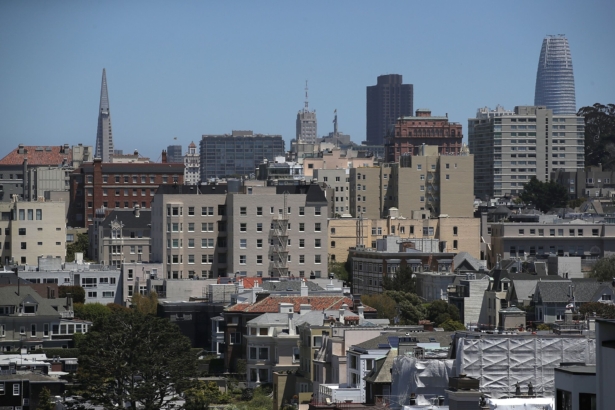Experts often argue over which factors contribute most to happiness, and “Psychology Today” has a hard time even pinning down a definition of the term, calling happiness “an electrifying and elusive state.”
“What people may not realize is that where they live may also determine how happy there are,” the personal-finance site WalletHub pointed out in its recent 2023’s Happiest Cities in America report released on Feb. 28.
At a time when the vast majority of Americans are stressed over inflation, violent crime, social divisiveness, and a generally poor outlook on the nation’s future, as a recent Harris Poll found, “it’s vital for people to boost their happiness however they can” and location definitely “plays a hand in how bright and gloomy our days are,” WalletHub stated.
In its latest annual report, WalletHub used “three key dimensions,” broken down into “30 relevant metrics,” to compare 182 of the largest U.S. cities and found that Fremont, California, came out on top.
A city of about 227,500 residents, Fremont ranked number one for both the “emotional and physical well-being” and “community and environment” dimensions that WalletHub analyzed but only 34th for “income and employment,” giving credence to the adage “money isn’t what makes you happy.”
The city also had the lowest depression rate and the lowest separation and divorce rate, WalletHub found.
On the ranked listing, after Fremont came San Jose, California, at number two, and Madison, Wisconsin, at number three.
Somehow, San Fransisco, with all its reported crime, drug use, and record homelessness, ranked 5th on WalletHub’s happiest U.S. cities list.

Detroit, Michigan, came in dead last at 182, with Shreveport, Louisiana, and Huntington, West Virginia, joining “Motown” for the bottom three.
Other notable findings that impact happiness or, conversely, unhappiness that WalletHub found:
- Norfolk, Virginia, has the most work hours on average, and Burlington, Vermont, has the fewest.
- Oakland, California, enjoys the highest income growth in the nation.
- Cleveland, Ohio, has the highest separation and divorce rate.
- The two cities with the highest depression rate in the country are both located in West Virginia—Charleston (ranked at 181st) and Huntington (at 182nd).
- People in South Burlington, Vermont, sleep the best in the country, while the worst sleepers live in Detroit, Michigan.
- A five-way tie exists for the highest suicide rate in the country—Colorado Springs, Colorado; Billings, Montana; Rapid City, South Dakota; Casper, Wyoming; and Juneau, Alaska.
- Juneau also ranked as the lowest-income growth city in the United States, which may have been a factor in it also having such a high rate of suicide.
To discover where your favorite city ranks, check WalletHub’s “Happiest Cities in America” rankings here.
You can also find WalletHub’s most recent Happiest States in America study here.
How WallerHub Determined the Happiest Cities in America
WalletHub examined 182 of what it determined to be the largest U.S. cities—150 of the nation’s most populated cities, plus at least two of the cities with the highest population within each of the 50 states.
Then it compared the 182 cities across three key dimensions: 1) emotional and physical well-being, 2) income and employment, and 3) community and environment.
The three key dimensions were further broken down into a total of 30 “relevant metrics” that WalletHub considered to be indicators of happiness—such as life satisfaction, depression, and suicide rates, income-growth rate and job satisfaction, separation, and divorce rate, hate crime incidents per capita, and ideal weather—and then weighted each in comparison to “full weight.”
The study, however, didn’t explain how the weight of each metric was determined or why one metric was weighted “heavier” than another.
Each city was then graded (on a scale of zero to 100, with 100 representing maximum happiness) and rank-ordered from 1 to 182.
Interestingly, one of the 30 “relevant metrics” the study used to analyze the “Emotional & Physical Well-being” dimension was “percentage of residents who are fully vaccinated against COVID-19.” Additionally, the metric was “double weighted,” with the study designers putting COVID-19 vaccination rate on par in importance with “depression rate” and “food-insecurity rate” and twice as important as the “suicide rate” and “life-satisfaction index” metrics.
The study also did not consider church attendance or marriage rate as a metric for happiness under the “Community & Environment” dimension, though it did evaluate the states based on “Separation & Divorce Rate.”
It also did not look at the alcohol addiction rate, though it did consider “Retail Opiod Prescriptions Dispensed per 100 Persons,” and the “Share of People Aged 12 or Older Who Used Marijuana in the Past Month” with a “quarter weight” and “half weight” designation, respectively.
No mention was given to children in the household, something that experts believe is a factor that, depending on the study, contributes either positively or negatively toward happiness, but not neutrally, according to “Psychology Today”.
The states’ political environment wasn’t considered, either, something that the 2022 Harris Poll, conducted on behalf of the American Psychological Association (APA), considers a significant stressor, where it found that 40 percent of participants felt that the “political environment in their state has made them consider moving to a different state.”
Just over half of all adults aged 18-44 (51 percent of 18- to 25-year olds and 53 percent of 35- to 44-year olds) would consider moving to a more politically agreeable state, the poll reported.
WalletHub got its data from various sources, including the U.S. Census Bureau, Bureau of Labor Statistics, Federal Bureau of Investigation, Centers for Disease Control and Prevention, Substance Abuse and Mental Health Services Administration, Administrative Office of the U.S. Courts, Feeding America, Glassdoor.com, and WalletHub research to include a separate study entitled “Most Caring Cities in America.”
NTD reached out to WalletHub for an explanation about the weighting of the metrics in its study, but the personal finance platform did not reply by publication time.


